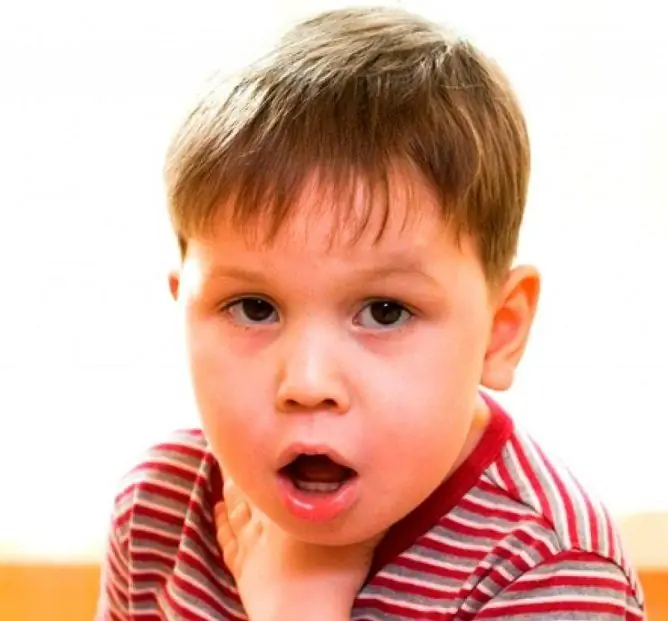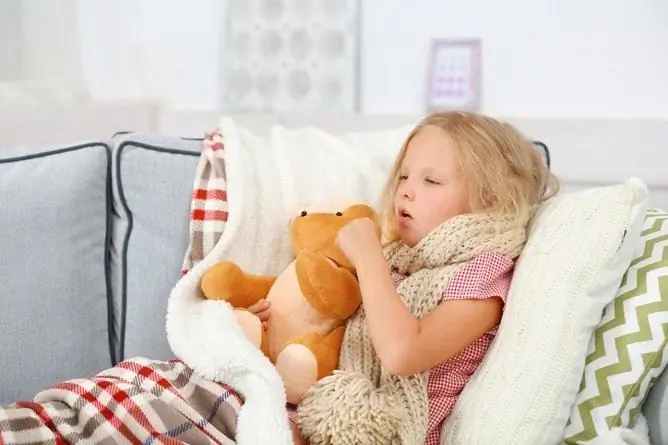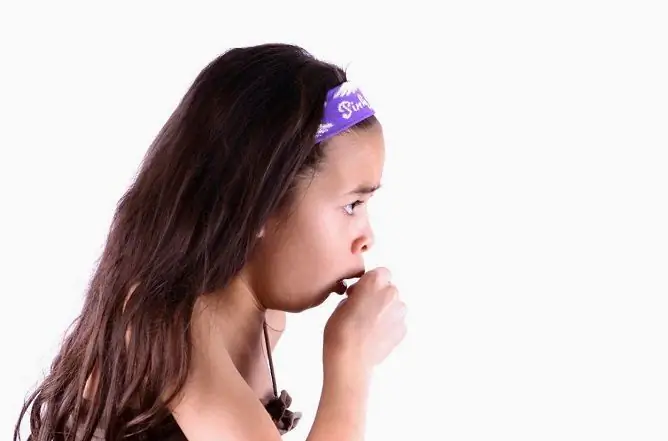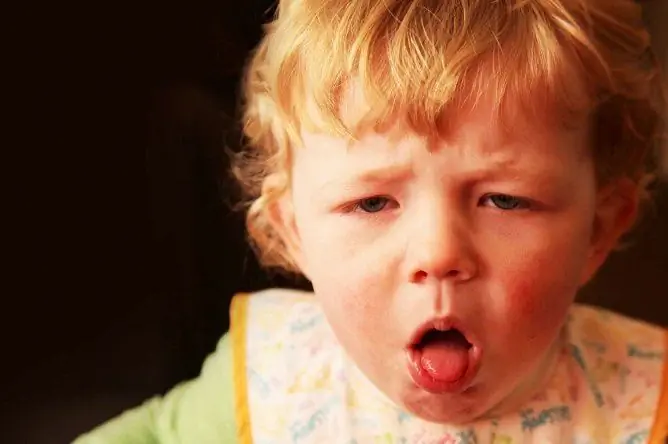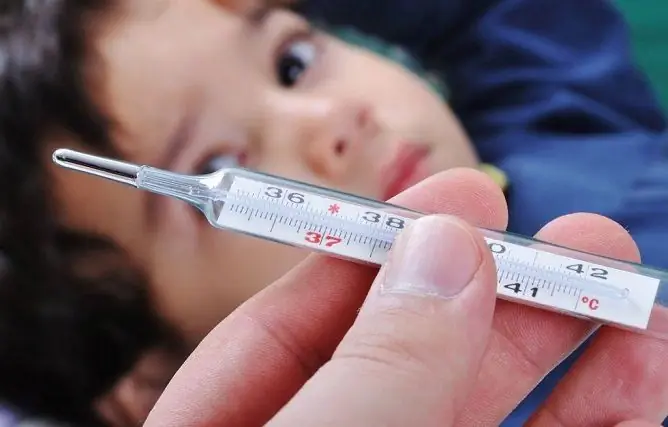- Author Rachel Wainwright wainwright@abchealthonline.com.
- Public 2024-01-15 19:51.
- Last modified 2025-11-02 20:14.
Barking cough in a child without fever: treatment, causes
The content of the article:
- Features of cough
-
What diseases cause
- Allergic laryngotracheitis
- Foreign body obstruction
- Psychogenic cough
- Dangerous symptoms
-
Treatment of barking cough without fever in children
- First aid
- Drug treatment
- General principles
- Inhalation
- Folk remedies
- Video
A barking cough in a child without fever should alert parents. Such a cough can be a symptom of stenosing laryngotracheitis, in which the lumen of the larynx narrows and there is a threat to life. It can be other, less dangerous diseases. In any case, you need to determine the cause of the development and treat it.

A barking cough in a child requires a mandatory visit to a doctor
Features of cough
A barking cough occurs when the larynx is affected, when the vocal cords swell. It has the following features:
- unproductive - not accompanied by sputum;
- worsens at night;
- rude (as if a dog is barking);
- accompanied by hoarseness.
What diseases cause
A barking, rough cough is characteristic of inflammation of the larynx of any etiology. If the cough is not accompanied by a fever, there may be only a few reasons. In children, this condition is often caused by allergic laryngitis, laryngeal obstruction, or psychogenic cough.
Allergic laryngotracheitis
Allergic laryngotracheitis is an allergic disease in which the larynx and trachea are affected.
The cough appears due to laryngeal edema. There are other symptoms of the disease:
- hoarseness of voice;
- swelling of the face (not always);
- a history of allergic reactions.
With allergic laryngotracheitis, the cough occurs sharply, against the background of complete well-being. Any allergen can be the cause of the development of pathology: plant pollen, dust, wool.
Foreign body obstruction
In young children, a rough cough can occur when a foreign body enters the airways (most commonly the larynx and bronchi). This is often observed when playing with small details, when eating.
The child has a violent cough that is rough in nature. Breathing is often disturbed. If the object passes through the larynx into the bronchi, the nature of the cough changes.
If a foreign body is aspirated, an ambulance should be called immediately.
Psychogenic cough
A rough, metallic-tinged cough can be psychogenic. Psychogenic cough occurs as a reaction to stressful situations, eventually becoming habitual (as a conditioned reflex).
Signs of a psychogenic cough:
- regularity;
- disappears at night;
- intensifies in stressful situations, conversation on topics unpleasant for the child.
If a psychogenic cough is suspected, organic pathology must be excluded.
Dangerous symptoms
Sometimes a harsh cough is a mild symptom that does not pose a risk to the child. In other cases, it indicates laryngeal edema. Dangerous symptoms indicating stenosing laryngotracheitis:
- difficulty breathing, shortness of breath;
- noisy breathing;
- pallor or blue discoloration of the skin;
- retraction of the intercostal spaces.
If a child has at least one of these symptoms, you should immediately consult a doctor.
Treatment of barking cough without fever in children
Treatment of a rough cough has several directions: relief of an acute attack and basic therapy. Medicines, medicinal plants, inhalations are used.
First aid
When a coughing attack occurs, first aid is needed:
- Calm down the child, take him in your arms.
- Provide fresh air.
- Drink warm tea - this will soften the cough, reduce the intensity of the attack.
- If you have an inhaler at home, let the alkaline solution breathe.
These recommendations will help relieve an attack, however, this is only a temporary measure.
Drug treatment
Medication is not used in all cases. With mild laryngitis and psychogenic cough, medications are not prescribed. It is enough to follow the general recommendations, to carry out inhalation. Be sure to use drugs for acute stenosing laryngitis, as well as in cases where the cough disrupts the general condition of the child.
How to treat a dry barking cough in a child without fever:
| Group of drugs | Indications for use | Mechanism of action and method of application |
| Glucocorticosteroids | Acute stenosing laryngotracheitis |
They have anti-inflammatory and anti-edema properties. Dexamethasone, Prednisolone, Budesonide are used. Inhaled forms of glucocorticoids (Budesonide) are used for inhalation with a nebulizer. In severe cases, parenteral administration is used. |
| Antihistamines | Acute stenosing laryngotracheitis | They have antiallergic effect, reduce edema. The most commonly used parenteral administration of diphenhydramine. |
| Coating preparations | Allergic laryngotracheitis | Creates a protective layer on the mucous membrane of the respiratory tract. Used syrup Herbion, Rubital forte. |
General principles
For any inflammation of the larynx, general principles must be observed:
- Humidify the air in the baby's room.
- Give warm drinks. Tea, rosehip broth, milk, alkaline mineral water (still) will do.
- Eliminate spicy, salty, hot and cold from the diet. Food should be warm, not irritating the mucous membrane.
- Create a protective mode - the child should talk a little and in a low voice (not in a whisper). This will reduce the stress on the vocal cords.
Compliance with the basic principles will create conditions for recovery and significantly speed up this process.

For a rough cough, the child needs frequent warm drinks.
Inhalation
The main method of treating a barking cough in a child without fever is inhalation. Inhalation is a local therapy method in which drugs are delivered directly to the respiratory tract.
The impact directly on the mucous membrane of the larynx and trachea is effective for the following reasons:
- Reducing swelling and inflammation, which makes breathing easier for the child.
- Moisturizing the mucous membrane - softens the cough.
- Lack of systemic effect - side reactions occur less often.
Inhalation can be carried out both at home and in a hospital. At home, a nebulizer is used for coughing in children.
Inhalation with a nebulizer is carried out with saline, alkaline solution, bronchodilators or glucocorticosteroids.
Folk remedies
The reason is that, if applied incorrectly, they may worsen rather than improve the condition of the child. The safest (in the absence of allergies) folk remedy is warm milk with honey or tea with lemon and honey.
Video
We offer for viewing a video on the topic of the article.

Anna Kozlova Medical journalist About the author
Education: Rostov State Medical University, specialty "General Medicine".
Found a mistake in the text? Select it and press Ctrl + Enter.

